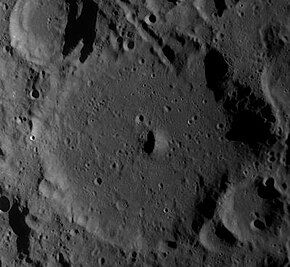Van der Waals (crater)
 LRO WAC image | |
| Coordinates | 43°54′S 119°54′E / 43.9°S 119.9°E |
|---|---|
| Diameter | 104 km |
| Depth | Unknown |
| Colongitude | 242° at sunrise |
| Eponym | Johannes Diderik van der Waals |

Van der Waals is a lunar impact crater on the far side of the Moon. It is a heavily eroded feature with an irregular outer rim. The edge is lowest along the southern side where it is little more than a circular crest along the ground. It is more developed along the northern side, but the rim is notched and rugged. The satellite crater Van der Waals W is attached to the exterior of the northeast, and Van der Waals H intrudes into the rim along the southeast. The interior floor is relatively even and featureless, with only a few tiny craterlets to mark the surface.
Nearby craters of note include Clark to the north, Carver to the east, and Pikel'ner to the southeast. About two crater diameters to the west-southwest is Lebedev.
Satellite craters
By convention these features are identified on lunar maps by placing the letter on the side of the crater midpoint that is closest to Van der Waals.
| Van der Waals |
Latitude | Longitude | Diameter |
|---|---|---|---|
| B | 41.0° S | 121.0° E | 17 km |
| C | 40.5° S | 123.6° E | 24 km |
| H | 44.3° S | 121.7° E | 31 km |
| K | 45.8° S | 122.0° E | 55 km |
| W | 41.3° S | 117.1° E | 46 km |
References
- Andersson, L. E.; Whitaker, E. A. (1982). NASA Catalogue of Lunar Nomenclature. NASA RP-1097.
{{cite book}}: Invalid|ref=harv(help) - Blue, Jennifer (July 25, 2007). "Gazetteer of Planetary Nomenclature". USGS. Retrieved 2007-08-05.
{{cite web}}: Invalid|ref=harv(help) - Bussey, B.; Spudis, P. (2004). The Clementine Atlas of the Moon. New York: Cambridge University Press. ISBN 978-0-521-81528-4.
{{cite book}}: Invalid|ref=harv(help) - Cocks, Elijah E.; Cocks, Josiah C. (1995). Who's Who on the Moon: A Biographical Dictionary of Lunar Nomenclature. Tudor Publishers. ISBN 978-0-936389-27-1.
{{cite book}}: Invalid|ref=harv(help) - McDowell, Jonathan (July 15, 2007). "Lunar Nomenclature". Jonathan's Space Report. Retrieved 2007-10-24.
{{cite web}}: Invalid|ref=harv(help) - Menzel, D. H.; Minnaert, M.; Levin, B.; Dollfus, A.; Bell, B. (1971). "Report on Lunar Nomenclature by the Working Group of Commission 17 of the IAU". Space Science Reviews. 12 (2): 136–186. Bibcode:1971SSRv...12..136M. doi:10.1007/BF00171763.
{{cite journal}}: Invalid|ref=harv(help) - Moore, Patrick (2001). On the Moon. Sterling Publishing Co. ISBN 978-0-304-35469-6.
{{cite book}}: Invalid|ref=harv(help) - Price, Fred W. (1988). The Moon Observer's Handbook. Cambridge University Press. ISBN 978-0-521-33500-3.
{{cite book}}: Invalid|ref=harv(help) - Rükl, Antonín (1990). Atlas of the Moon. Kalmbach Books. ISBN 978-0-913135-17-4.
{{cite book}}: Invalid|ref=harv(help) - Webb, Rev. T. W. (1962). Celestial Objects for Common Telescopes (6th revised ed.). Dover. ISBN 978-0-486-20917-3.
{{cite book}}: Invalid|ref=harv(help) - Whitaker, Ewen A. (1999). Mapping and Naming the Moon. Cambridge University Press. ISBN 978-0-521-62248-6.
{{cite book}}: Invalid|ref=harv(help) - Wlasuk, Peter T. (2000). Observing the Moon. Springer. ISBN 978-1-85233-193-1.
{{cite book}}: Invalid|ref=harv(help)
